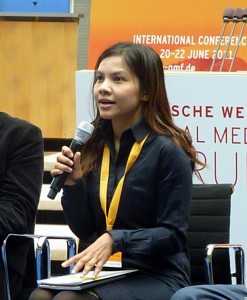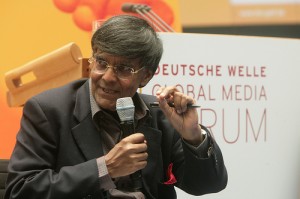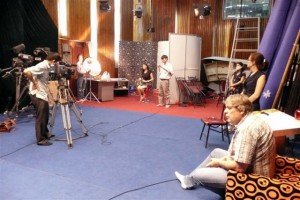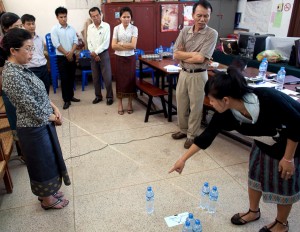Search Results for Tag: interview
Teaching TV interviews in Vietnam
A good interview should be informative, authentic, credible and sometimes even surprising. In the past two weeks, the participants in our workshop ‘Advanced Interview Training’ were able to discover the special benefits of this journalistic format.
Together with my colleague Uli Köhler, I am training journalists in the Vietnamese capital Hanoi. Our 15 trainees work for Vietnam Television (VTV). Most of them are reporters in Hanoi, but we’ve also got the VTV correspondents to Russia and to China in our group. All of our participants are keen to learn more about conducting interviews and recording vox pops.
As Uli and I will leave Vietnam in a couple of days, the trainees are now working on their final productions. Their topic is ‘same-sex marriage in Vietnam’. They chose this topic themselves after an hour-long discussion.
![]() read more
read more
Action learning in Laos
DW Akademie trainer Daniel Hirschler sends this report from a workshop in Laos.
As a trainer, I like working with what I call “action learning settings”. This basically means designing the workshop in a way that learning happens in a good mix of experiencing something and then talking about it and reflecting upon the experience.
Workshop designs are like recipes for cooking: It’s not just the amount of the ingredients that counts, it’s also their quality. And as with any recipe, things can work out perfectly, but they can also go terribly wrong. So for a trainer, going into an action learning workshop can be fraught with tension. Will things work out? What if they don’t…?
![]() read more
read more
Different perspectives benefit all of society
 Media rights advocate Supinya Klangnarong from Thailand spoke during a panel discussion on advocacy versus objectivity at this year’s Deutsche Welle Global Media Forum in Bonn, Germany. The three-day conference in June focused on the role of the media in the context of human rights and globalization.
Media rights advocate Supinya Klangnarong from Thailand spoke during a panel discussion on advocacy versus objectivity at this year’s Deutsche Welle Global Media Forum in Bonn, Germany. The three-day conference in June focused on the role of the media in the context of human rights and globalization.
Klangnarong is vice-chair of the Campaign for Popular Media Reform (CPMR), a national NGO working towards the democratization of communication. She is also a board member of the Thai Netizen Network, an independent network of Internet citizens working to uphold cyber liberty in Thailand.
![]() read more
read more
Media’s role in communicating sustainable development
 At this year’s Deutsche Welle Global Media Forum, which took place from June 20-22 in Bonn, Germany, sustainable development expert Mohan Munasinghe recommended that the media help spread the word to the world’s elite that it’s in their own interest to limit consumption and allow the poor to grow out of their poverty. In terms of resources, the “more the rich consume, the less there is for the poor,” he said. Otherwise the entire global system is at risk of collapse with unforeseen consequences for everyone.
At this year’s Deutsche Welle Global Media Forum, which took place from June 20-22 in Bonn, Germany, sustainable development expert Mohan Munasinghe recommended that the media help spread the word to the world’s elite that it’s in their own interest to limit consumption and allow the poor to grow out of their poverty. In terms of resources, the “more the rich consume, the less there is for the poor,” he said. Otherwise the entire global system is at risk of collapse with unforeseen consequences for everyone.
As vice chair of the Intergovernmental Panel on Climate Change, Mohan Munasinghe shared the Nobel Peace Prize with Al Gore in 2007. Currently he is chairman of the Munasinghe Institute for Development (MIND) in Colombo, a professor of sustainable development at the University of Manchester in the U.K., a distinguished guest professor at Peking University and honorary senior adviser to the government of Sri Lanka. He is widely recognized as having introduced a framework called sustainomics to make development more sustainable.
![]() read more
read more
…and action! Cinema sans convention
Once again the Berlin International Film Festival, also known as the Berlinale, has become the focus of filmmakers and movie buffs from around the world. Every year, DW-AKADEMIE conducts a five-week workshop centered around the red-carpet event. Called “Film Festival and Event Management”, the workshop spotlights young film festival managers from Asia and Africa.
Two of this year's 12 participants are Luzviminda Casagan from Pasay City, the Philippines, and Arthur Mataruse from Cape Town, South Africa. Casagan works for the Cinemalaya Independent Film Festival, Mataruse for Encounters and the Out in Africa film festivals. We spoke to both of them to find out more about film festivals and filmmaking in their home countries.
How would you describe the importance of films in cinema and television in your home country?
 Arthur Mataruse (pictured left): For us, films mainly have the function to strengthen the culture and the common identity in South Africa. Our aim is also to show other cultures and lifestyles.
Arthur Mataruse (pictured left): For us, films mainly have the function to strengthen the culture and the common identity in South Africa. Our aim is also to show other cultures and lifestyles.
Luzviminda Casagan: In the Philippines, fewer and fewer people are going to the cinema. One reason is that it is now easier to get films on DVD or from the Internet. Consequently, it's becoming more difficult for filmmakers to distribute and sell their films. Our aim with the Cinemalaya Independent Film Festival is to support young Philippine filmmakers whose films provide new insights and pursue new concepts, especially when that promotes art and culture.
![]() read more
read more





